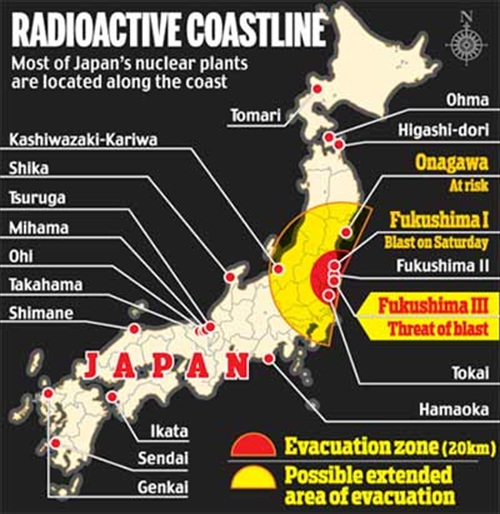Sometimes it’s super dangerous to have politicians who couldn’t care less about human lives as long as they can make some millions (through corruption) at their backyards. It’s one thing that your country couldn’t generate enough power to need demands but it’s another thing if you’re toying with the idea of nuclear plants when you’ve in excess of 40% in electricity. And if your country’s population is less than 30 million, nuclear plant is the last toy you wish to play.
As much as you admire Japan, in reality Tokyo Electric Power Co. (TEPCO) is responsible for the nuclear mess that the country is facing now. TEPCO shares have been falling as if the world is going to end tomorrow and the stock is now at its lowest since 1951. The stock has so far lost more than 80% of their value since the earthquake and nuclear crisis erupted. Some analysts have estimated that the company may have to pay as much as 10 trillion yen (US$120 billion; £74 billion) in claims.
TEPCO, the fourth largest power company in the world supplies one-third of Japan’s electricity. With profits likely to be severely affected and net borrowings of US$88 billion to service, it’s no wonder there’re literally no buyers but sellers for the stock. And if a country such as Malaysia that’s so corrupt that a newly stadium built a year ago could collapse is adamant about building some nuclear plants, do you think you could have good night sleeps knowing how efficient those engineers would be administering the nuclear plant?
Having nuclear plants at your backyard is like carrying a bomb with you. If the country’s car manufacturer, Proton Holdings Berhad (KLSE: PROTON, stock-code 5304), can’t even fix their car’s power window problem after years of defect, the safest thing you should do before they switch on the nuclear plant is to take the next available flight and get the hell out of the country.
After dumping 11,500 tons of radioactive water into the ocean, TEPCO announced that samples taken from seawater near one of the reactors contained 7.5 million times the legal limit for radioactive iodine on April 2. Two days later, that figure dropped to 5 million. While experts agree that radiation dissipates quickly in the vast Pacific, direct exposure to the most contaminated water measured would lead to “immediate injury.”
Yoichi Enokida, a professor of materials science at Nagoya University’s graduate school of engineering, said that seawater may be diluting the iodine, which decays quickly, but the leak also contains long-lasting cesium-137, which can build up in fish over time. Things get more serious when there was report that fish caught off Ibaraki prefecture, at a spot about 50 miles (80 kilometers) from the plant, contained levels of radioactive iodine that would have exceeded the new provisional limit.
It would extremely stupid and dangerous for Malaysia Najib’s administration to push its way to construct nuclear plants in the country, just because his cronies would be receiving millions of dollars in kickbacks. It’s definitely not worth the risks. If it’s safe to build and managing nuclear plants, Najib’s mentor, former premier Mahathir would have done that decades ago. Being the father of corruption, Mahathir was way smarter than Najib in plundering the country’s wealth but Mahathir knows the problem with nuclear plants – the nuclear waste will come haunting you?
Other Articles That May Interest You …
- Japan Nuclear Crisis Stabilizes, Libya In Focus (Photos)
- Japan’s Chernobyl – Greed For Profits Above Safety?
- Nuclear Fears Rips Global Stocks, Ain’t Over Yet
- Photo Galleries: The Day After Japan’s Tsunami
- Japan Tsunami’s Greatest Problem – Nuclear Meltdown

|
|
April 5th, 2011 by financetwitter
|


|

|

|

|

|

|






























Comments
Add your comment now.
Leave a Reply